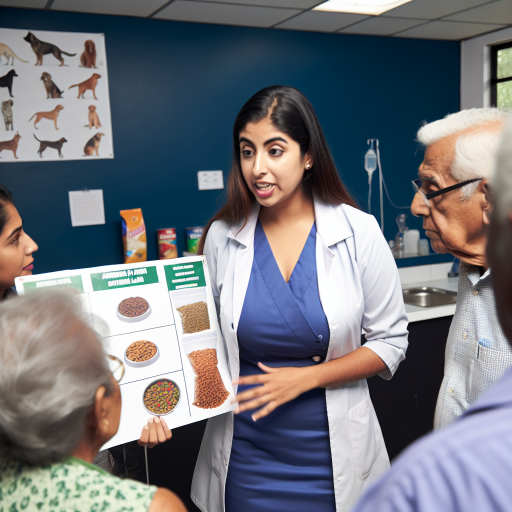Introduction:
It is crucial to inspire students in agricultural science as it plays a vital role in society.
Through agricultural science, we can address environmental issues.
We can ensure food security.
Additionally, we can promote sustainable practices.
Share real-world success stories:
- Share success stories of individuals who have pursued careers in agricultural science.
- Highlight the impact they have made in their communities or globally.
- Inspire students by showing them the possibilities and opportunities in the field.
One way to inspire students in agricultural science is by sharing real-world success stories of individuals who have pursued careers in this field.
By highlighting the impact these individuals have made in their communities or globally, students can see the tangible results of their work and be inspired to follow in their footsteps.
For example, you could share the story of a farmer who revolutionized the way crops are grown, resulting in increased yields and more sustainable practices.
Or you could highlight a researcher who developed a new technology that has helped farmers around the world improve their productivity.
By showcasing these success stories, students can see the possibilities and opportunities available to them in agricultural science.
They can see that their work has the potential to make a real difference in the world and inspire them to pursue a career in this field.
Conduct hands-on activities:
Organize hands-on activities such as planting seeds, tending to crops, or caring for animals.
These activities allow students to experience the practical side of agricultural science firsthand.
Engage students in learning through experiential activities that connect theory to real-world applications.
Hands-on activities are an essential component of teaching agricultural science.
By providing students with opportunities to engage in practical tasks, educators can inspire a deeper understanding and appreciation for the subject matter.
One way to incorporate hands-on activities is to organize a gardening project.
Students can plant seeds, nurture the plants as they grow, and observe the entire growth cycle.
This hands-on experience will not only teach students about plant biology but also instill a sense of responsibility and stewardship for the environment.
Another hands-on activity could involve caring for animals on a school farm.
Students can learn about animal husbandry, nutrition, and health care practices.
Transform Your Career Today
Unlock a personalized career strategy that drives real results. Get tailored advice and a roadmap designed just for you.
Start NowThis firsthand experience will not only build empathy for animals but also teach students valuable skills in animal management.
Engaging students in experiential activities is key to fostering a love for agricultural science.
By connecting classroom learning to real-world applications, students can see the direct impact of their knowledge and skills.
This approach also helps to make abstract concepts more tangible and relatable.
Hands-on activities play a crucial role in inspiring students in agricultural science.
By providing opportunities for practical learning, educators can help students develop a deeper understanding and passion for the subject.
Through these experiential activities, students can see the relevance and importance of agricultural science in their lives and the world around them.
Discover More: Biotechnology and the Future of Farming Practices
Invite guest speakers:
- Invite professionals in the field of agricultural science to speak to students.
- Allow students to ask questions and learn from experts in the field.
- Provide insight into various career paths and opportunities in agricultural science.
Inviting guest speakers to share their expertise and experiences in agricultural science can be a great way to inspire students.
These professionals can provide valuable insights and real-world examples that can help students connect their classroom learning to practical applications in the field.
By inviting experts in agricultural science to speak to students, you are exposing them to a diverse range of perspectives and career opportunities within the industry.
This can be particularly beneficial for students who may not have considered a career in agriculture before.
Guest speakers can shed light on the different career paths available in agricultural science, from research and development to sustainability and agribusiness.
When inviting guest speakers, it’s important to create an interactive and engaging session.
Encourage students to ask questions and participate in discussions with the experts.
This not only allows students to gain a deeper understanding of the subject matter but also helps them develop critical thinking and communication skills.
Furthermore, guest speakers can serve as role models for students, showcasing the diverse opportunities available in agricultural science and inspiring them to pursue their interests in the field.
Hearing from professionals who are passionate about their work can motivate students to explore their own interests and consider a future career in agricultural science.
Overall, inviting guest speakers to speak to students in agricultural science can provide valuable insights, inspiration, and mentorship.
Showcase Your Business Today
Reach thousands of readers actively exploring professional services. Publish your business profile and grow your audience now.
Publish NowBy exposing students to real-world experiences and career paths in the field, guest speakers can help ignite a passion for agricultural science and motivate students to pursue further studies or careers in the industry.
You Might Also Like: Poultry Farming Trends and Poultry Scientists
Incorporate technology:
- Integrate technology into agricultural science lessons.
- Show students how technology is advancing the field and creating new opportunities.
- Spark students’ interest by showing them the modern and innovative aspects of agricultural science.
In today’s fast-paced world, technology plays a crucial role in shaping various industries, including agriculture.
As educators, incorporating technology into agricultural science lessons can not only enhance the learning experience but also inspire students to explore the field further.
By integrating technology into their lessons, teachers can demonstrate to students how modern tools and advancements are revolutionizing the agricultural sector.
From precision agriculture techniques to drone technology, students can witness firsthand how technology is shaping the future of farming.
Showing students the direct impact of technology on agriculture can spark their interest and curiosity.
By highlighting the innovative aspects of agricultural science, educators can inspire students to think creatively and explore new opportunities within the field.
Utilizing tools such as simulators and online resources can provide students with hands-on experience and a deeper understanding of agricultural concepts.
By incorporating interactive technology, educators can make lessons more engaging and relevant to students’ daily lives.
Additionally, introducing students to emerging technologies such as artificial intelligence and blockchain in agriculture can broaden their perspectives and encourage them to think critically about the future of the industry.
By staying up-to-date with the latest advancements, students can develop a passion for innovation and problem-solving in agricultural science.
Overall, incorporating technology into agricultural science lessons is a powerful way to inspire and motivate students.
By showcasing the modern and innovative aspects of the field, educators can ignite curiosity and encourage students to explore the vast possibilities that technology offers in agriculture.
Discover More: Dairy Scientist’s Involvement in Cheese Production
When it comes to inspiring students in agricultural science, one of the key aspects to focus on is the importance of sustainability.
Teaching students about sustainable practices is crucial in ensuring the future of agriculture and the well-being of our planet.
Here are some ways to highlight the importance of sustainability:
Educate students on the importance of sustainable practices in agriculture:
- Teach students about the impact of conventional farming methods on the environment.
- Discuss the benefits of sustainable farming practices such as organic farming and crop rotation.
- Explain how sustainable agriculture promotes biodiversity and protects natural resources.
Show the impact of sustainable farming methods on the environment and society:
- Illustrate how sustainable farming reduces chemicals and pollutants in the environment.
- Highlight the role of sustainable agriculture in mitigating climate change and preserving ecosystems.
- Discuss the social benefits of sustainable agriculture such as improved food security and rural development.
Inspire students to pursue careers in agricultural science that prioritize sustainability:
- Introduce students to career opportunities in sustainable agriculture, such as sustainable farming practices and agricultural research.
- Showcase success stories of individuals who have made a positive impact in the field of sustainable agriculture.
- Encourage students to think critically about the role they can play in advancing sustainability in agriculture.
By emphasizing the importance of sustainability in agricultural science, educators can instill a sense of purpose and passion in students, motivating them to make a difference in the world through their work in the field of agriculture.
Gain More Insights: Grape Breeding and Genetic Research

Offer Mentorship Programs
Establish mentorship programs where students can be paired with professionals in agricultural science.
Provide guidance, support, and career advice to students interested in the field.
Foster relationships between students and mentors to inspire and encourage them.
Mentorship programs can play a crucial role in inspiring students in agricultural science.
By pairing students with professionals in the field, they can gain valuable insights, guidance, and support.
This assistance can help shape their career paths.
When students have access to mentors with experience and expertise in agricultural science, they feel inspired and motivated.
Mentors can offer valuable advice on academic courses, research opportunities, internships, and career paths.
This guidance helps students make informed decisions about their future.
Moreover, mentorship programs help students build relationships with industry professionals.
This expands their networks and opens up opportunities for collaboration and learning.
By fostering these connections, students can gain firsthand insights into the day-to-day workings of agricultural science.
Such experiences inspire them to explore new ideas and innovative solutions to complex challenges.
Additionally, mentors serve as role models for students.
They showcase the diverse career paths and possibilities available in agricultural science.
By sharing their experiences, successes, and challenges, mentors inspire students to overcome obstacles.
This encourages them to take risks and pursue their passions with dedication and resilience.
Mentorship programs provide a valuable platform for students to engage with professionals.
They can seek guidance and explore their interests in agricultural science.
By offering mentorship opportunities, educational institutions empower students to reach their full potential.
Showcase Your Business Today
Reach thousands of readers actively exploring professional services. Publish your business profile and grow your audience now.
Publish NowStudents can make meaningful contributions to the field.
Inspiration Through Success Stories
In order to inspire students in agricultural science, showcasing success stories within schools can be a powerful tool.
Highlighting successful projects or initiatives related to agricultural science within schools can serve as motivation for students to actively engage in the subject.
By showcasing student-led initiatives that have made a positive impact, schools can empower students to take ownership of their learning and contribute to their community.
Benefits of Showcasing Success Stories
- Increases student motivation
- Builds a sense of pride and accomplishment
- Encourages collaboration and innovation
- Provides real-world examples for learning
When schools highlight the achievements of their peers in the realm of agricultural science, it not only boosts morale but also sets a standard of excellence for students to strive towards.
Students are more likely to be inspired and motivated when they see tangible examples of success within their own school community.
Ways to Showcase Success Stories
School Newsletter or Website
One effective way to showcase success stories is through the school newsletter or website.
By featuring articles or updates on successful agricultural science projects, students can easily access and celebrate the achievements of their peers.
Award Ceremonies or Assemblies
Recognizing student-led initiatives during award ceremonies or school assemblies is another impactful way to showcase success stories.
By publicly acknowledging the hard work and dedication of students, schools can inspire others to follow suit.
Guest Speaker or Panel Discussions
Bringing in guest speakers or hosting panel discussions featuring students who have excelled in agricultural science can provide valuable insights and inspiration.
It allows students to learn from their peers and see firsthand the impact of their work.
Impact of Showcasing Success Stories
- Boosts student confidence and self-esteem
- Fosters a culture of excellence and innovation
- Encourages healthy competition and goal-setting
- Creates a supportive and inclusive learning environment
Showcasing success stories within schools can play a significant role in inspiring students in agricultural science.
By highlighting the achievements of their peers, students are motivated to push themselves beyond their limits and strive for greatness in their own endeavors.
Importance of Inspiring Students in Agricultural Science
Inspiring students in agricultural science is essential for the future of our world.
Engaging students in hands-on activities can ignite a passion for agricultural science.
Making connections to real-world applications enhances their understanding.
Providing mentorship helps guide young minds toward a career in agriculture.
Recognizing the significance of agricultural science is vital for addressing global challenges.
Food security, sustainability, and climate change are pressing issues we face today.
By inspiring students, we are investing in future innovators in agriculture.
We should encourage all readers to take action in this important mission.
Teachers, parents, and industry professionals all play a role in this endeavor.
Your guidance and encouragement can make a significant impact on the future.
Additional Resources
College of Agriculture & Life Sciences: Home
John W. Garland College of Engineering, Science, Technology, and …
[E-Books for Sale]
The Big Book of 500 High-Paying Jobs in America: Unlock Your Earning Potential
$19.99 • 500 High-Paying Jobs • 330 pages
Explore 500 high-paying jobs in America and learn how to boost your career, earn more, and achieve success!
See All 500 High-Paying Jobs of this E-Book
1001 Professions Without a Degree: High-Paying American Jobs You Can Start Now
$19.99 • 1001 Professions Without a Degree • 174 pages
Discover 1001 high-paying jobs without a degree! Unlock career tips, skills, and success strategies for just $19.99!




